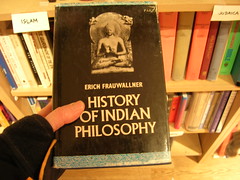| History of Indian Philosophy (Photo credit: brewbooks) |
There are two most important terms that are part of self-study and learning. These are the Shanka and Shakk. The Shanka stands for any question that arises due to curiosity. When one does not get answer for such questions, one starts to doubt, that we know in Indian Philosophy and Psychology as Shak or Shakk. Now, the doubt is not the result of any action of suspicious type. The curiosity and suspicion are not almost one and the same thing. We all have curiosity to know and when faulty learning takes places, we cannot digest the points given to us and that is what makes curiosity to conceive doubt rather than believe. More we try to convince, stronger the doubt gets.
It seems to me that we understand the concept of Shanka, the question that arises due to curiosity but certainly not because of doubt. So, the most ancient methods of learning and researching in Indian Philosophy advises that one should always go for Shanka Nivirati, the removal of anything that may lead to doubt.
As we all keep praying for faith, and beg it from God, the doubt is the only thing that can weaken it.
The reason seems that in modern times that we do not go for the Shanka Nivirati, the removal of budding doubt which is inside the soil and if sprouts cannot be cut apart into pieces as it spreads doubt in almost all parts of our life.
So, the Indian philosophers and thinkers advice to throw away the most poising thing away. It is not doubt but its seed that lies in heart as a curiosity unanswered. This is how Holy Gita advices to remove it as Lord Krishna asks Arjana to remove all Shanka's, the doubts so that the most deep rooted seed of doubt, which is poisonous and needs to be removed.
Thus, our modern age needs that we learn to clear our doubts before it harm our mental health. The curiosities answered never leave any doubt remain at our homes, the hearts.
While one struggles with doubt, it is out of ignorance, the lack of knowledge and thus we all need answers for what we do not know and verify what we know.
So, if we have any question out of curiosity, we can get answer rather than doubting it as if a kind of myth, preaching, superstition, religious kind of knowledge that we cannot very due to lack of knowledge. The knowledge, which is not faulty seems to be the one that is compatible with the natural laws and principles. The set of natural laws and principles is the Indian Philosophy of Vedas, the Wisdom from Insight. It has nothing to do with any religion as its is what most Indians know as the Shastra. The Shastra means scientifically proven and also what one can verify and is integral part of Indian classical arts, music, dance, math, grammar and other faculties of knowledge.
Please read the previous part of this article at: http://teenandyouthinlife.blogspot.in/2012/04/swadhyaya-study-or-self-observation.html
Thanks for your time to read.
Copyright by Dr. Harmander Singh-Protected and archived by World_Wide_OCR_dot_com Seal (TM) File, Canada








No comments:
Post a Comment